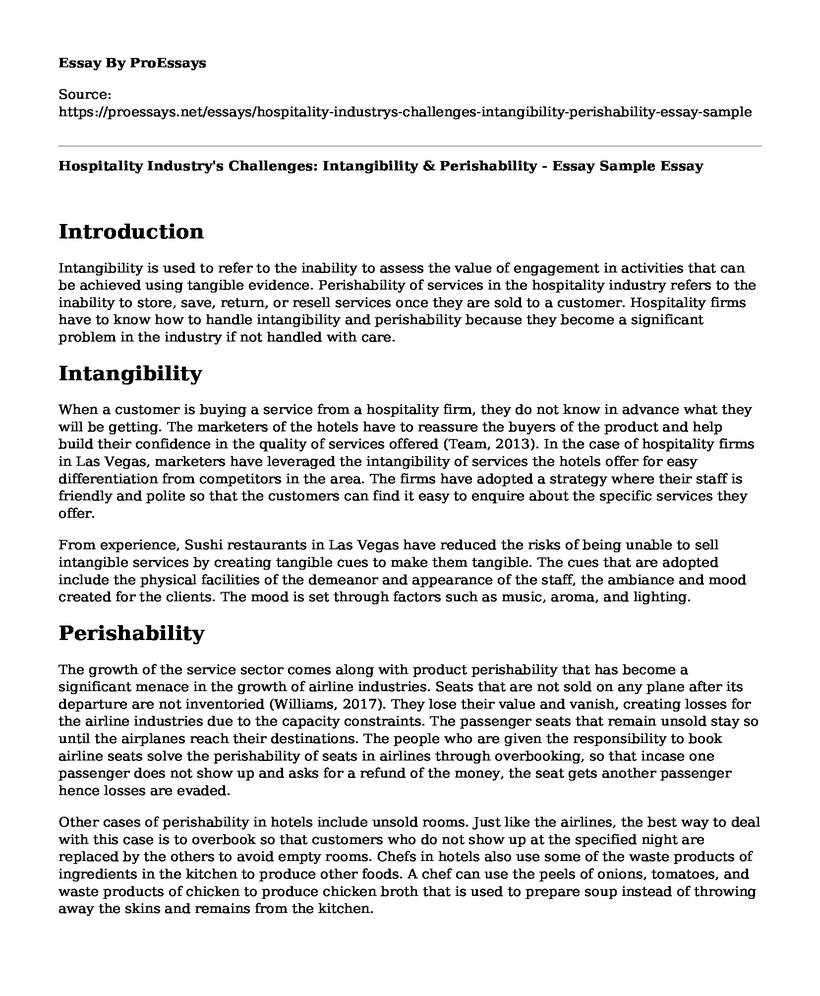Introduction
Intangibility is used to refer to the inability to assess the value of engagement in activities that can be achieved using tangible evidence. Perishability of services in the hospitality industry refers to the inability to store, save, return, or resell services once they are sold to a customer. Hospitality firms have to know how to handle intangibility and perishability because they become a significant problem in the industry if not handled with care.
Intangibility
When a customer is buying a service from a hospitality firm, they do not know in advance what they will be getting. The marketers of the hotels have to reassure the buyers of the product and help build their confidence in the quality of services offered (Team, 2013). In the case of hospitality firms in Las Vegas, marketers have leveraged the intangibility of services the hotels offer for easy differentiation from competitors in the area. The firms have adopted a strategy where their staff is friendly and polite so that the customers can find it easy to enquire about the specific services they offer.
From experience, Sushi restaurants in Las Vegas have reduced the risks of being unable to sell intangible services by creating tangible cues to make them tangible. The cues that are adopted include the physical facilities of the demeanor and appearance of the staff, the ambiance and mood created for the clients. The mood is set through factors such as music, aroma, and lighting.
Perishability
The growth of the service sector comes along with product perishability that has become a significant menace in the growth of airline industries. Seats that are not sold on any plane after its departure are not inventoried (Williams, 2017). They lose their value and vanish, creating losses for the airline industries due to the capacity constraints. The passenger seats that remain unsold stay so until the airplanes reach their destinations. The people who are given the responsibility to book airline seats solve the perishability of seats in airlines through overbooking, so that incase one passenger does not show up and asks for a refund of the money, the seat gets another passenger hence losses are evaded.
Other cases of perishability in hotels include unsold rooms. Just like the airlines, the best way to deal with this case is to overbook so that customers who do not show up at the specified night are replaced by the others to avoid empty rooms. Chefs in hotels also use some of the waste products of ingredients in the kitchen to produce other foods. A chef can use the peels of onions, tomatoes, and waste products of chicken to produce chicken broth that is used to prepare soup instead of throwing away the skins and remains from the kitchen.
References
Team, B. M. S. (2013, June 30). Strategies to deal with intangibility in the hotel industry. Retrieved from https://www.bms.co.in/strategies-to-deal-with-intangibility-in-hotel-industry/
Williams, K. R. (2017). Dynamic Airline Pricing and Seat Availability (No. 2103). Cowles Foundation for Research in Economics, Yale University. Retrieved from https://pdfs.semanticscholar.org/1c76/08d5ce5c9a3d57497e4526f5c7c77494e7f3.pdf
Cite this page
Hospitality Industry's Challenges: Intangibility & Perishability - Essay Sample. (2023, Mar 28). Retrieved from https://proessays.net/essays/hospitality-industrys-challenges-intangibility-perishability-essay-sample
If you are the original author of this essay and no longer wish to have it published on the ProEssays website, please click below to request its removal:
- Is the Hofstede Framework a Useful Aid in Understanding Cultures and Sub-cultures?
- Foreign Currency Risk Essay
- The Impact of Sexual Orientation Diversity in the Hospitality Industry Paper Example
- Starting a Business Is a Risky Endeavor Paper Example
- Paper Example on Sexual Harassment in Business: Quid Pro Harassment
- Eating Out: How Restaurants Get You to Spend More - Essay Sample
- Essay Example on COVID-19 Impacts: Hospitality Industry Hit Hardest by Pandemic







